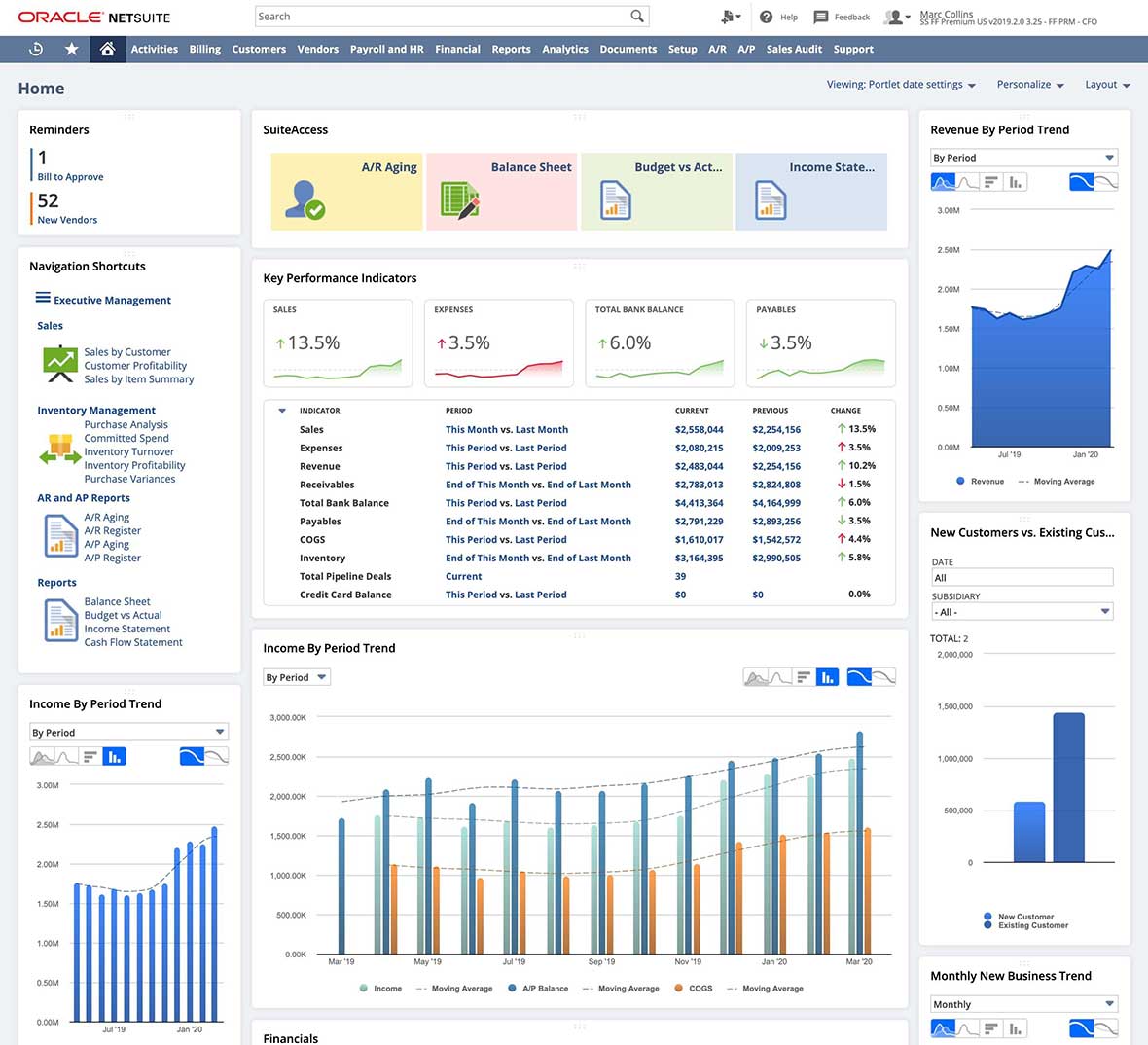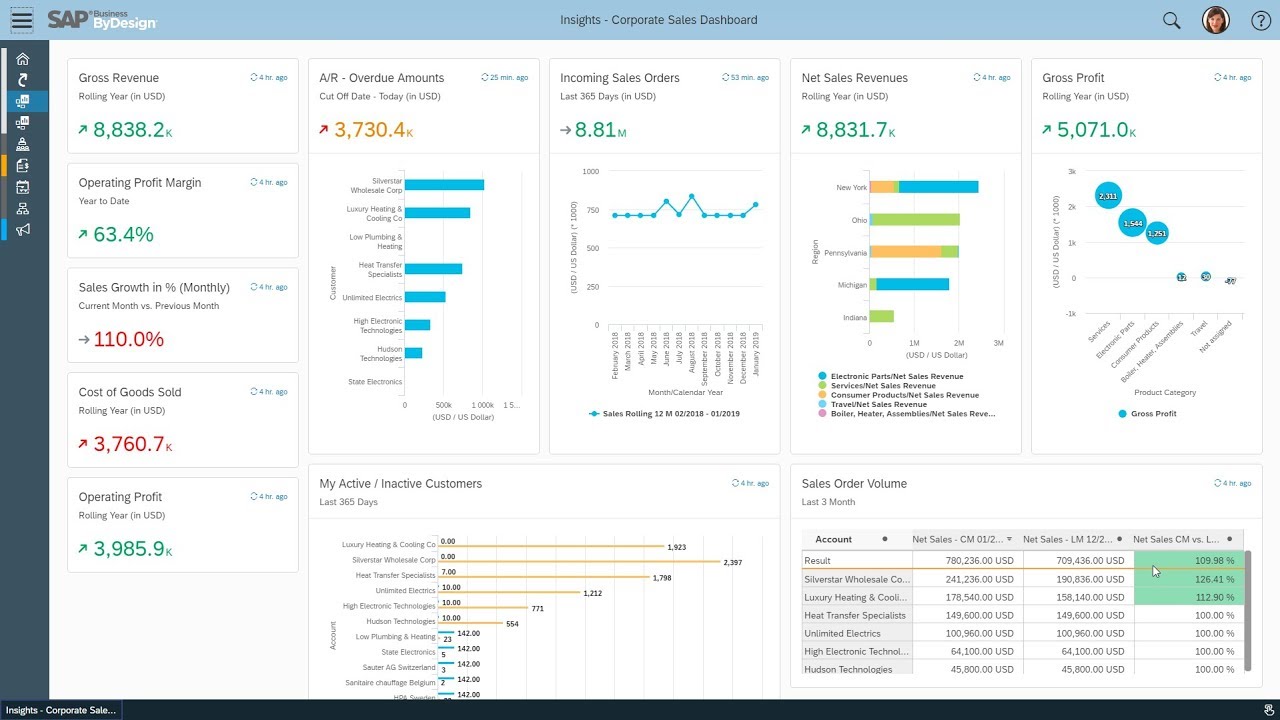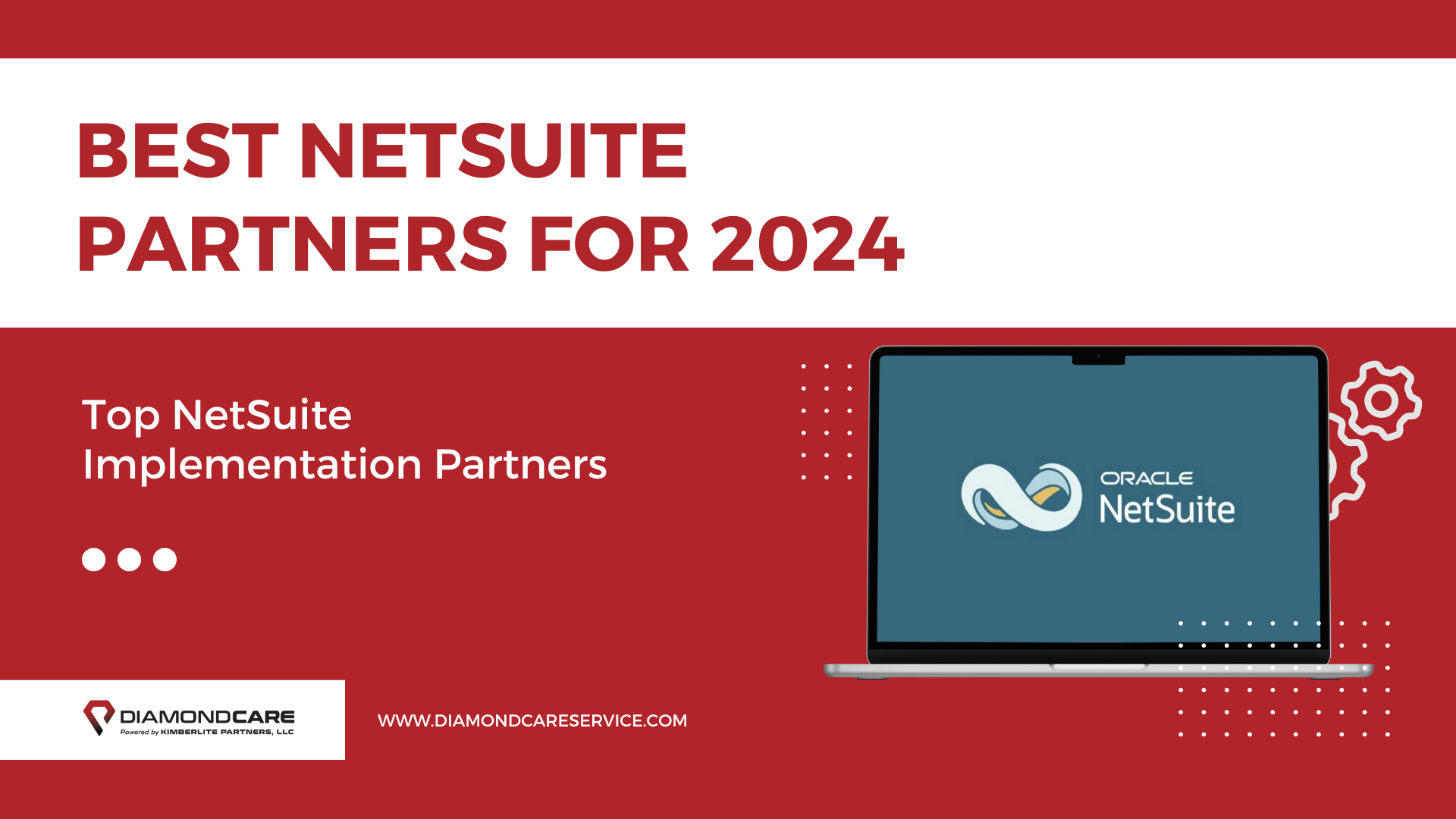NetSuite Partners List 2025: Top Solution & Implementation Providers Guide
Are you looking to streamline your business processes and take your company to the next level? Implementing a robust ERP system like NetSuite can be...
.png?width=450&height=315&name=Untitled%20design%20(75).png)
Our experts guide you through every step — from planning to go-live — ensuring a smooth, successful NetSuite rollout tailored to your business.

Post-implementation support that goes beyond one-size-fits-all solutions.
Join a team that values growth, collaboration, and innovation. We believe in empowering people to do their best work while enjoying the journey.
11 min read
Admin : Jun 13, 2024 3:57:56 PM
How do you choose between two of the most powerful ERP systems available today—NetSuite and SAP? This decision is critical for any organization aiming to enhance operational efficiency and drive strategic growth. The stakes are high: a recent survey shows that 73% of companies see ERP systems as vital to achieving their digital transformation goals. The right ERP system can significantly impact a business's agility, efficiency, and competitiveness. So, how can technology leaders navigate this choice effectively?
This blog post provides a detailed comparison between NetSuite and SAP, examining their features, benefits, implementation considerations, and how they align with evolving business needs. NetSuite offers a cloud-native, all-in-one solution ideal for fast-growing organizations due to its adaptability and user-friendly experience. SAP, with its robust customization options and extensive scalability, is suited for larger enterprises with complex operational demands. Key topics include cost considerations, implementation complexity and timeframes, training and support services, and critical aspects of security and compliance. Understanding these differences is essential for technology leaders to make informed ERP decisions that align with strategic business goals.
NetSuite and SAP are both popular ERP (Enterprise Resource Planning) solutions that offer a wide range of features and benefits for businesses. However, there are some key differences between the two that may influence your decision when choosing the best ERP solution for your business.
NetSuite stands out as a comprehensive business management suite designed to streamline various aspects of a company's operations. It brings together a wide array of modules including financials, CRM, e-commerce, inventory and order management, PSA, HR, and analytics into a single, cloud-based platform. This integration facilitates not just enhanced financial oversight and reporting but also supports in-depth management of resources, better customer engagement, and informed strategic planning. NetSuite, as a SaaS (Software as a Service) based ERP solution, offers the massive benefit of eliminating the need for large initial investments in hardware and software (and human resources), providing businesses with a cost-effective and highly scalable solution. Its cloud-based nature ensures real-time visibility and access to business operations from anywhere, enhancing collaboration and decision-making processes. NetSuite's architecture allows for extensive customization, enabling businesses to tailor the platform to their unique processes and needs, all while maintaining a singular version of the ERP solution to guarantee uniformity across its user base. This approach not only improves operational efficiency and productivity but also empowers businesses to adapt swiftly to market changes and customer demands.
On the other hand, SAP is a leading provider of on-premise and cloud-based ERP solutions. It offers a modular approach, allowing businesses to choose the specific modules they need for their operations. SAP is known for its robustness and extensive customizability, making it a popular choice for large enterprises.
SAP's diversified ERP offerings, tailored for small to midmarket businesses, span three main systems: S/4HANA, Business One, and Business ByDesign. Each system focused on different sized companies and industries, with S/4HANA and Business One available for both cloud and on-premises deployment, while Business ByDesign is exclusively a cloud-based SaaS offering. These platforms provide foundational support for critical business functions such as accounting, finance, inventory management, and HR, with varying degrees of specialization. A key differentiator is the ability to extend these core systems with other SAP solutions, enhancing functionalities in areas like analytics, CRM, and ecommerce. However, this expansion often requires navigating complex integrations due to differing codebases. This ecosystem's complexity can sometimes pose challenges for businesses seeking agility, as illustrated by the case of XCMG, a construction machinery manufacturer, which experienced delays when expanding into new markets due to the system's rigidity. This contrasts with more streamlined systems, where setup and reporting can be more agile, emphasizing the importance of choosing an ERP system that aligns with a business's operational dynamics and growth strategies.
Overall, NetSuite and SAP have their own strengths and weaknesses. By understanding the differences between the two, you can make an informed decision about which ERP solution is best suited for your business.
Comparing Oracle NetSuite and SAP poses a significant challenge, as both are among the top ERP vendors globally, each showcasing distinct advantages, target audiences, and core capabilities.
While both platforms aim to streamline business operations, enhance efficiency, and support growth, they cater to slightly different audiences and offer distinct sets of features and benefits. Let's dive into a comparative analysis of NetSuite and SAP, highlighting the key features and benefits of each to help businesses decide which solution might be the best fit for their needs.

A software company that has developed a cloud-based business management platform used by more than 37,000 fast-growing organizations across the globe. That platform consists of a suite of applications that help companies run their business, understand the performance of their businesses and drive major efficiency gains and cost savings.
Although NetSuite may be the oldest cloud-based ERP, it is not the only provider of SaaS based ERP software. So what separates NetSuite from other cloud solutions? Here are five highlights:
Unified view of the business
NetSuite offers a seamless solution for businesses to streamline their operations on a unified platform. By integrating finance, supply chain, manufacturing, HR, and ecommerce into one system with a centralized database, employees can easily access and monitor all aspects of their business with just a few clicks. The feature set offered by NetSuite is truly unmatched, making it the go-to choice for SMBs and MMEs seeking a cloud-based ERP solution with a wide range of seamlessly integrated capabilities.
Native integrations
NetSuite's integrated applications seamlessly share and retrieve data from a centralized database, ensuring a single source of truth. By incorporating natively integrated modules, the platform eliminates the need for unreliable third-party integrations that may struggle to support real-time updates. This cohesive architecture presents a consistent user interface across all modules, reducing training time and enhancing productivity. Users can effortlessly navigate through order-to-cash, procure-to-pay, and other complex processes within a single application without the hassle of re-entering or exporting information.
True cloud
NetSuite was intentionally crafted for the cloud environment from its inception. In contrast, many so-called "cloud" ERP systems are merely hosted or hybrid cloud solutions - essentially traditional (on-premise) software retrofitted for online access in a hosted environment. These alternatives often suffer from issues like version constraints, sluggish upgrades, and limited scalability. On the other hand, NetSuite stands out as a multi-tenant, vendor-managed cloud solution designed to seamlessly accommodate business growth with ample room for expansion.
Deep reporting capabilities
The abundance of data streaming from various departments and business units into the NetSuite platform drives its robust reporting capabilities. Users have the flexibility to generate reports on a wide range of metrics and insights, leveraging the platform's integrated reporting tools. Additionally, NetSuite features role-based dashboards that swiftly provide employees, managers, and executives with the necessary information to make well-informed decisions.
Built-in flexibility
NetSuite can serve a broad array of industries not only because it comes with impressive functionality, but because it can adapt to meet the requirements of different businesses. The platform can be customized to accommodate your processes and corporate structure through SuiteCloud apps and tools, whether you’re a multinational brand with six subsidiaries or a startup still building its first product.

With its wide array of features and benefits, SAP provides organizations with transformational ERP software solutions that have made it a solid choice for thousands of businesses across numerous industries.
Here are the key features and benefits of SAP, shedding light on how it contributes to the success of organizations from different perspectives:
Integration of Core Business Processes
One of the standout features of SAP ERP is its ability to seamlessly integrate core business processes. By consolidating functions such as finance, human resources, procurement, inventory management, and sales, SAP ERP provides a unified platform for managing these critical areas. This integration eliminates data silos, enhances data accuracy, and facilitates real-time reporting and analysis.
Enhanced Collaboration and Communication
SAP enhances teamwork and communication within organizations by offering a centralized platform for information sharing. With functionalities like document management, workflow automation, and task delegation, SAP ERP promotes seamless communication and collaboration among teams. This feature proves especially advantageous for global enterprises with dispersed teams. For example, a multinational corporation can leverage SAP's collaboration tools to streamline the approval process for purchase orders, fostering transparency and efficiency across various departments and locations.
Regulatory Compliance and Risk Management
Ensuring regulatory compliance and effectively managing risks are crucial components for organizations in diverse industries. SAP ERP offers features that support businesses in adhering to regulatory requirements and mitigating risks with precision. By incorporating built-in controls, audit trails, and robust reporting capabilities, SAP ERP facilitates seamless compliance with industry standards and governmental regulations.
Scalability and Flexibility
SAP ERP provides seamless scalability and adaptability, empowering organizations to effortlessly adjust and expand. From burgeoning startups to established enterprises, SAP ERP can effortlessly grow alongside businesses as they broaden their operations. Its modular design allows organizations to cherry-pick specific modules that align with their needs, ensuring a tailored solution that mitigates unnecessary expenses and complexities.
When comparing the cost of NetSuite ERP to SAP, several factors need to be considered, including licensing fees, implementation costs, and ongoing maintenance and support expenses. NetSuite operates on a subscription-based model, meaning you pay a recurring fee based on the number of users and modules required. The base license fee for NetSuite starts around $999 per month, with an additional cost of $129 per user per month. Implementation costs for NetSuite can vary widely depending on the complexity and scope of the deployment, typically ranging from $25,000 to $100,000 or more. One of the advantages of NetSuite is its relatively faster and less complex implementation compared to SAP, potentially leading to lower overall costs. Additionally, NetSuite’s subscription model includes regular updates and maintenance within the subscription fee, although additional support packages can be purchased if needed.
In contrast, SAP offers both on-premise and cloud-based solutions. The on-premise model typically involves a significant upfront cost for perpetual licensing, while the cloud-based model operates on a subscription basis. SAP's pricing is highly customizable and can vary significantly based on the specific needs of the organization. For cloud-based SAP solutions, costs can start around $1,500 per user per year but can increase based on the modules and number of users required. Implementation costs for SAP can be significantly higher than NetSuite due to the complexity and customization often involved. These costs can range from $50,000 to several million dollars, depending on the scale and customization required. The implementation timeline for SAP is generally longer, contributing to higher overall costs. For on-premise solutions, SAP charges annual maintenance fees, typically around 22% of the initial licensing cost, while cloud-based solutions include regular updates and maintenance within the subscription fee, with additional support packages available as needed.
When considering scalability and customization, both NetSuite and SAP offer robust solutions, but SAP is often chosen by larger enterprises needing extensive customization and integration capabilities. The total cost of ownership (TCO) for NetSuite may be lower initially, with quicker implementation times making it a cost-effective solution for small to mid-sized businesses. However, SAP’s extensive features and customization options can provide higher value for larger, more complex organizations despite higher initial costs. It's essential for organizations to carefully assess their needs and obtain detailed quotes from both vendors. User and module requirements will significantly impact the overall cost, so understanding these factors is crucial when choosing between NetSuite and SAP.
When comparing NetSuite and SAP for implementation, it's essential to consider various factors to ensure a successful ERP integration. Factors such as customization needs, data migration requirements, training costs, and consulting services play a crucial role in the implementation process.
Customization is a key factor when choosing an ERP system. SAP is well-known for its robust functionality and high level of customization, making it ideal for large enterprises with complex needs. However, this level of customization can increase the implementation time and costs. According to a study by Panorama Consulting, SAP implementations can take up to 30% longer due to extensive customization requirements.
NetSuite, in contrast, offers a more streamlined implementation process. Its user-friendly interface and intuitive design make it a popular choice for businesses looking for a quicker and more straightforward deployment. For example, a mid-sized manufacturing company reported reducing its implementation time by 50% with NetSuite compared to a previous SAP deployment.
Data migration is a critical part of ERP implementation. Both SAP and NetSuite provide tools to facilitate this process, but the complexity varies. NetSuite's SuiteSuccess methodology includes a data migration toolkit that has reduced data migration errors by 40% for some users. SAP's data migration process is more complex and often requires specialized consultants, increasing the cost and time.
Training costs can significantly impact the overall implementation budget. On average, NetSuite users report spending $10,000-$20,000 on training, while SAP users may spend upwards of $50,000 due to the complexity and breadth of the system. NetSuite’s online tutorials and user community have been praised for their accessibility and effectiveness, leading to a faster learning curve.
The right consulting partner can make or break an ERP implementation. Well-known consulting firms such as Deloitte and Accenture offer services for both SAP and NetSuite. However, the cost of consulting for SAP implementations can be 20-30% higher due to the need for more specialized skills. A case study by Gartner highlighted that businesses using NetSuite consulting services saw a 15% reduction in implementation costs compared to those using SAP consultants.
SAP’s extensive features and deep customization options can pose challenges during the implementation phase. A survey by CIO.com found that 60% of SAP users reported implementation challenges related to system complexity. On the other hand, NetSuite’s simpler design allows for a smoother transition and faster adoption by users across different levels of the organization, with 75% of NetSuite users reporting a seamless implementation experience.
When considering the timeframe for implementation, it is important to weigh the trade-offs between speed and customization. NetSuite is known for its rapid deployment, making it an attractive option for businesses looking to quickly integrate an ERP solution. For instance, a retail company implemented NetSuite within 6 months, whereas a similar SAP project took over a year.
Scalability is crucial for growing businesses. NetSuite is widely recognized for its exceptional scalability and flexibility. According to a report by Forrester, NetSuite can scale up to 10,000 users with minimal performance degradation. SAP ERP's modular structure also supports scalability, but with a higher cost and complexity. An enterprise using SAP reported a 20% increase in operational efficiency after scaling their system to support global operations.
Quality training and support are essential for a smooth ERP operation. NetSuite and SAP offer extensive training options, including online tutorials, webinars, certification programs, and on-site training sessions. NetSuite’s support team has been rated highly by G2 Crowd, with an 85% satisfaction rate. SAP’s support, while comprehensive, has received mixed reviews, with some users citing slower response times.
Ultimately, the training and support services offered by the ERP vendor should align with your specific needs and preferences. By evaluating the quality, accessibility, and responsiveness of these resources, businesses can make an informed decision that enhances the overall user experience and maximizes the long-term value of their ERP investment.
When it comes to data security and compliance, both NetSuite and SAP prioritize safeguarding your valuable information, but they employ distinct approaches to achieve this. NetSuite offers strong and comprehensive security features, including encryption, user authentication controls, and role-based access permissions, ensuring that only authorized personnel can access sensitive data. Additionally, NetSuite provides regular security updates and compliance certifications to meet industry standards and regulations, giving businesses peace of mind knowing their data is well-protected.
On the other hand, SAP also emphasizes robust data security through advanced encryption protocols, secure user authentication methods, and comprehensive audit trails that track and monitor data access. SAP's security framework is meticulously designed to meet the stringent requirements of various industries, providing a secure environment for storing and managing critical business information.
While both NetSuite and SAP prioritize data security, their approaches and technologies may differ in addressing specific security needs. For example, SAP's advanced encryption and audit trail capabilities might be particularly appealing to industries with highly stringent compliance requirements. Conversely, NetSuite's user-friendly interface and regular compliance updates can be advantageous for businesses seeking a straightforward yet secure solution.
It's essential for businesses to carefully evaluate each platform's security features and compliance certifications to determine which solution best aligns with their data protection requirements and regulatory obligations. By selecting an ERP solution with robust security measures, organizations can effectively mitigate the risk of data breaches and ensure the confidentiality and integrity of their data assets. For more information on the security features and compliance certifications of these platforms, consider reviewing the detailed resources available on NetSuite's security page and SAP's security overview.
Choosing the right ERP solution is a critical decision that can significantly impact your business's agility, efficiency, and ability to adapt in a rapidly evolving marketplace. This comparative analysis between NetSuite and SAP has highlighted the key features, benefits, and considerations associated with each platform, providing valuable insights to help you make an informed decision.
NetSuite excels with its cloud-native, all-in-one approach, offering rapid adaptability, a user-friendly experience, and seamless integration of business functions. This makes it an ideal choice for small to medium-sized businesses and mid-market enterprises. Its robust scalability and comprehensive reporting capabilities further enhance its appeal to fast-growing organizations looking for a complete business management suite.
In contrast, SAP, with its extensive customization options, vast scalability, and modular approach, is designed for larger enterprises needing complex operational solutions. SAP's ability to integrate core business processes and enhance collaboration, combined with a strong focus on regulatory compliance and risk management, makes it a solid choice for organizations seeking a highly customizable ERP solution.
When evaluating NetSuite and SAP, consider the costs, implementation factors, training and support services, and the critical aspects of security and compliance. Each platform has its unique strengths and may better suit different organizational needs and growth strategies.
If you're considering a NetSuite ERP implementation and have concerns about its complexity, potential impact, or long-term ROI, Kimberlite Partners can help. Our team of experts will guide you through the process, ensuring you maximize the benefits of your ERP investment. Contact us today to get started and unlock the full potential of your business.

Are you looking to streamline your business processes and take your company to the next level? Implementing a robust ERP system like NetSuite can be...

What is NetSuite? NetSuite is a cloud-based enterprise resource planning (ERP) software suite that helps businesses manage core functions such as...

At SuiteWorld 2024, Oracle NetSuite delivered a powerful lineup of new product enhancements aimed at improving efficiency and accelerating growth for...